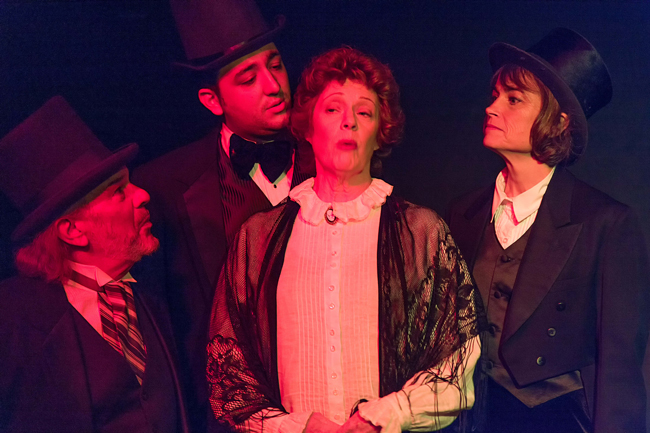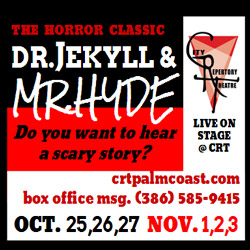
A few weeks ago City Repertory Theatre opened its third season in Palm Coast opened with the unusually peppy and always popular “Joseph and the Amazing Technicolor Dream Coat.” Unusual in that John Sbordone’s theater company has always been reliably unpredictable, its productions designed to push audiences to the edge of their seats, and then place those seats at the edge of a precipice. It’s been the closest thing to a brainy roller-coaster ride in Palm Coast.
With “Dr. Jekyll and Mr. Hyde,” which opens at 7:30 tonight for a two-weekend run, CRT is back to its dark delights. It might not be as terrifying as FX’s “American Horror Story,” but this show is “scary and profound,” says Sbordone, and it’s arriving in time to make Palm Coast a bit more Halloweenie. Get used to that edge again.
For those who don’t know the original Robert Louis Stevenson story first published in 1886, “The Strange Case of Dr. Jekyll and Mr. Hyde” takes place in the late 1800s London. It follows the generally good-natured scientist Henry Jekyll who, for deranged personal reasons, decides to split his moral self from his amoral self. He does this by concocting a potion that transforms him into the unconscionable Edward Hyde. But Jekyll’s experiment is a failure: he’s created a monster, but his remaining good self is as flawed as ever, and a bit intractable.
In this 2008 interpretation of the Stevenson story by Jeffery Hatcher, there are four different, harried Hyde personages—each played by a different actor, each of whom, in turn, plays multiple different characters themselves. These types of performances, giving the same actor the chance to play simultaneously different roles typify Sbordone’s young theater. Josh Fagundes plays five characters here, including the “psychotic wild man” version of Hyde—the one who wants “to rip everything to shreds. He’s just literally insane.”
City Rep’s interpretation is about personality, not physical appearances, which is also usually true of the theater. “What’s cool about the show is we don’t differentiate appearances at all,” Fagundes says of switching between characters. “Our costumes are the same throughout. The only way to separate the Hydes from the other characters is with a simple hat or a cane.”
“It’s very episodic,” Sbordone says of his attraction to to Hatcher’s version. “The pacing goes along much more quickly than other versions of Jekyll and Hyde. And that there are four Hydes is extraordinarily fun to work with. It’s a good story to be told by multifaceted actors.” Sbordone plays one himself, in addition to the lawyer Gabriel John Utterson.
The play is also a good fit for the newly renovated store-front theater, which has been excavated of unnecessary things like ceilings and at least one wall, though actors still strained for space in this one. “We only have two entrances. We’d like to have four or five. The show was made originally for a proscenium stage. That’s a challenge. We’re working it through, and it’s quite interesting to do.”
While those four or five entrances would’ve been nice, there’s really only one specific door, a handmade prop, one with “many meanings,” that matters, says Diane Ellertsen, who’s assistant director this time around. “To me, the door represents any given person going in and out of any given personality trait they happen to be dealing with, so even though it’s a physical door for entering and exiting, it lets people in psychologically.”
Ellersten helps Sbordone with “fine-tuning some of the idiosyncrasies,” of which there are many when dealing with the story of someone suffering from a dissociative identity disorder, much like Norman Bates, the young man from Alfred Hitchcock’s “Psycho.”
Bobbi Fouts is the only actress in the show who doesn’t play a Hyde role—Elizabeth, who turns out to be a romantic interest for both the good and bad guy.
 “When Jekyll turns into Hyde without taking the potion, when he doesn’t mean to, when it just comes over him,” Fouts says, “it’s not because of greed or malice or hatred towards anyone, or anger even, it’s because of love. He sees Elizabeth, who is Hydes’s love interest, and it triggers Hyde back into him.” In other words, as repugnant as Hyde is, there is still a piece of him that can be moved.
“When Jekyll turns into Hyde without taking the potion, when he doesn’t mean to, when it just comes over him,” Fouts says, “it’s not because of greed or malice or hatred towards anyone, or anger even, it’s because of love. He sees Elizabeth, who is Hydes’s love interest, and it triggers Hyde back into him.” In other words, as repugnant as Hyde is, there is still a piece of him that can be moved.
Peter Gutierrez plays the third and most prominent Hyde. He doesn’t think the man is redeemable. He’s confident about that, and for good reason: of all the despicable Hydes on stage, he plays the “mean and nasty one.” Gutierrez, who had actually visited the pub in Edinburgh where Stevenson had secluded himself to write the original story (“obviously, he had a drinking problem”) was intrigued when Sbordone handed him the script. “It was darker and more experimental. I’ve always been a fan of the original, but this one has a nice little twist to it,” Gutierrez says.
The hardest part, he says, is not pulling out his inner bastard. “That part is easy.” What’s hard is when he has to take off the hat and switch abruptly from that guy to one of the more benevolent, secondary personas. For a show with so little auxiliary support, the pressure is palpable. Without props, it’s all character-driven. “So if you’re good, it’s going to be good. If you’re bad, it’s going to be bad,” Gutierrez says. “It’s a good thing John takes his sweet time developing characters.”
Peggy Jones plays the fourth and softest of the Hyde quartet and also Jekyll’s butler, Poole. While she adds a woman’s touch to the crudity of the other Hydes, she’s certainly “not on the side of the Angels,” she says.
Of course, there’s only one Henry Jekyll, played by Jonathon Haglund, who played Jacob and Potiphar in “Joseph and the Amazing Technicolor Dream Coat,” to bounce off the nasty lot. “I respect the pain and anguish he’s going through, the realization that he isn’t as pure as he thought and the world isn’t as pure as he’d like it to be,” Haglund says. “He wanted serenity and peace of mind, not this tumultuous rage and horror.”
Haglund, of course, manages to relate to the doctor as well, “trying to keep my sanity every day. Through every breath we’re challenged. We can either take that as a challenge and cope and succeed or we can let it overcome us and fall down that fiery hole.” He adds: “If you really analyze it you don’t need a special tincture or potion. You just need the reality that you’re in charge and you’re in control.”
****
“Dr. Jekyll and Mr. Hyde” runs October 25 and 26 and November 1 and 2 at 7:30 p.mm, with 2 p.m. matinees October 27 and November 3. Tickets are $20 for adults and $15 for students. Tickets can be purchased easily here.





























Lonewolf says
Saw it…and liked it a lot.